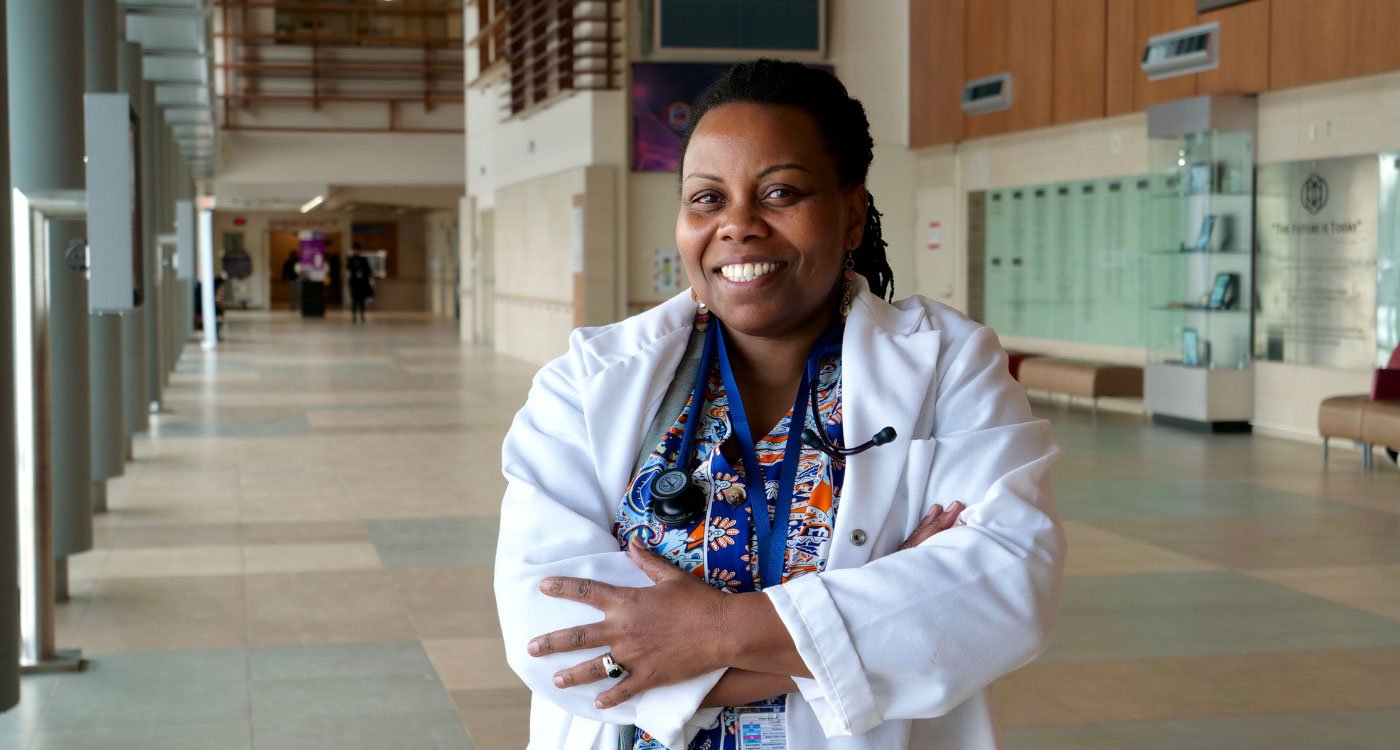
With over 10 years of experience as a Nurse Practitioner, Beatrice has spent the last two years helping patients manage the challenges of sickle cell disease (SCD).
Her career in health care has taken her to many hospitals, primary care clinics, home and community care settings and public health units supporting school health and wellness. Just as she felt called back to the bedside, she came across a nurse practitioner (NP) job posting at Osler. She shares her passion for advocating for and supporting patients, most of whom are of African descent, as they navigate SCD.
Tell us about your role in the sickle cell clinic.
I am the NP for the adult program in Osler’s sickle cell disease clinic. I provide consultations for patients admitted with SCD at Brampton Civic, collaborating with the hematologist and other physicians to control the effects of the disease on patients.
I also assist with discharge planning and help patients transition smoothly from hospital to home, providing follow-up support to ensure they have the resources they need. Our clinic isn’t just about treating symptoms—it’s about supporting the whole person. We focus on both the physical and emotional challenges of living with SCD.
What is sickle cell disease?
SCD is a complex genetic blood disorder that is especially common among people of African descent. With SCD, the red blood cells, which should be flexible and round, become stiff and crescent shaped. This prevents them from flowing smoothly, leading to blockages and complications anywhere in the body, from the brain (which can cause strokes, vision loss), to heart and kidney failure and damage to the joints.
While pain is the most well-known symptom, vascular blockages can cause organ damage, and if left untreated, can lead to long-term complications. We’re fortunate in Ontario to have universal newborn screening, which diagnoses SCD early.
Why is advocacy so important for patients with SCD?
Advocacy is a huge role of mine. Because SCD is often a misunderstood disease, advocacy and education for care providers is necessary to ensure appropriate treatment is given.
I teach my patients how to advocate for themselves while accessing care. I am deeply aware of the social and racial challenges that patients may face, particularly those from Black communities.
How does it feel to care for a predominantly Black patient population?
Honestly, it has been one of the most humbling experiences of my career. I’ve worked with people from all backgrounds but working with this community has been especially meaningful. Getting to hear my patients’ stories and seeing their daily struggles has really opened my eyes.
I can’t pretend to walk in my patients’ shoes, but I can relate to some of the challenges they face from a racial-cultural perspective. Experiencing subtle micro-aggressions and biases while navigating the health care system can be disheartening and leave room for health disparities. This connection allows me to care for patients with greater empathy and understanding, which builds trust. It also fuels my drive to advocate for them in ways that feel safe and culturally appropriate, making sure they have the support they need, beyond just medical care.
What does Black History Month mean to you?
Black History Month is really special to me. I have always seen it as a time to celebrate the contributions of Black people in our communities and around the world, but more recently, I’ve started to see it as not just a celebration of others, but of my own racial identity and contribution to the lives of others. It feels like a personal celebration (almost like a birthday!) where I get to celebrate my rich ancestry and what it means to be Black. It gives me a proud sense of belonging.
I believe Black History Month is for all - it’s an invitation for everyone to join in, learn and reflect. It’s Canadian history and everyone should be a part of it!
How does it feel to have an impact?
My impact is exactly why I do this work. I’ve always had a passion for health care and helping others achieve their goals, and this role allows me to make a real difference in the lives of my patients. Watching someone go from struggling with chronic pain and hospital visits to thriving in school and in their life—it’s why I do what I do.
My path to this work has been a long one. I’ve worked in various health care settings over the years, but when I found sickle cell care, it just felt like the right fit. It’s where I want to be, and I’m so grateful to be able to make an impact at Osler and in our community.

